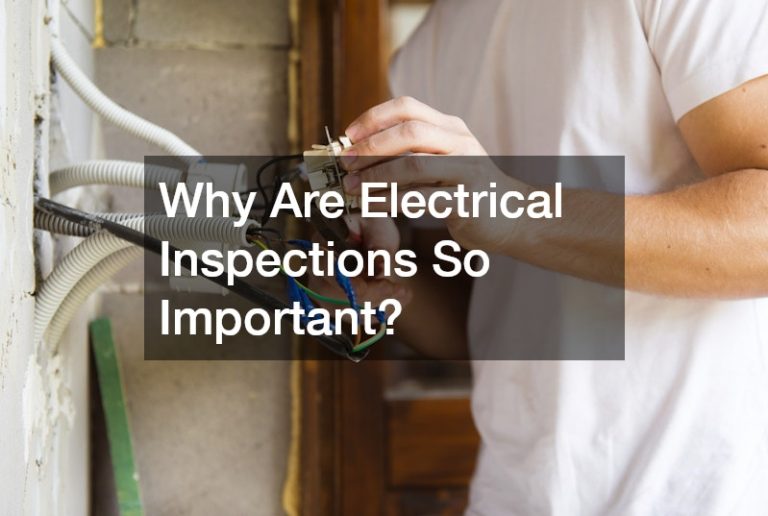Disclaimer: Benro Properties. This site provides home improvement content for informational purposes only.
Electrical inspections are a vital component of maintaining a safe and efficient home or business environment. Whether you’re moving into a new property, upgrading existing systems, or addressing specific electrical issues, having an electrical inspection performed by a licensed professional is essential for several reasons. Electrical systems are complicated, and even minor problems can lead to significant consequences if left unchecked. In this article, we will explore why electrical inspections are so important, from safety concerns to improving efficiency and saving money.
1. Ensuring Safety
The most important reason for conducting electrical inspections is safety. Faulty wiring, outdated components, and improper installations can all lead to electrical hazards, including fires, electric shocks, or even fatalities. According to the National Fire Protection Association (NFPA), electrical malfunctions are responsible for a significant number of home fires every year. In fact, electrical fires account for about 13% of all house fires in the United States. An electrical inspection can identify these potential hazards before they escalate, ensuring your family, employees, and property are protected.
Inspectors examine wiring, circuit breakers, grounding systems, and other components to ensure that everything is up to code and functioning correctly. They also assess whether the electrical systems meet current standards, which may have changed since the original installation. In homes or buildings with older electrical systems, this is especially important, as outdated wiring can pose serious risks.
2. Preventing Electrical Fires
Electrical fires are one of the most common and dangerous types of house fires, and the leading cause is faulty wiring or overloaded circuits. Old or deteriorating wiring, combined with overuse of outlets and improper connections, can create a fire risk that’s often invisible until it’s too late. Electrical inspections help detect these dangers before they turn into disasters. A qualified electrician will check for things like exposed wiring, faulty connections, damaged cords, or improperly grounded circuits, which can all lead to fires if not addressed.
In addition, inspections can help identify the need for updated equipment like circuit breakers, which are designed to shut off electrical power when a system is overloaded, preventing potential overheating or fires. Regular electrical inspections give homeowners and business owners peace of mind, knowing their electrical systems are safe and up to standard.
3. Ensuring Compliance with Building Codes
Building codes exist to ensure the safety and functionality of the electrical systems in homes and businesses. These codes are constantly updated to reflect new safety standards, advancements in technology, and evolving safety knowledge. An electrical inspection ensures that the system complies with local regulations and standards, which may vary by location.
When buying a new property or undergoing renovations, an electrical inspection will verify that the existing systems meet current codes. If you’re adding new appliances or making upgrades, a licensed electrician can ensure that the electrical system can handle the new load, avoiding future issues such as overheating or power failure. Non-compliance with electrical codes can lead to serious safety concerns, potential legal issues, or complications when selling a property. Inspections guarantee that the property is up to date with all necessary requirements, ensuring both safety and legality.
4. Saving Money on Energy Bills
Electrical inspections can help identify inefficiencies in your system that may be driving up your energy costs. Faulty wiring, outdated appliances, or inefficient systems often result in higher electricity consumption. For example, an electrical system that is not properly grounded may cause energy to be wasted, resulting in higher bills. Similarly, older appliances may consume more energy than newer, more energy-efficient models.
An inspection can also reveal whether your electrical system is overloaded. If circuits are consistently tripping or outlets are sparking, it may indicate that the system is working harder than it should be, which can lead to unnecessary energy waste. By identifying these inefficiencies, an inspection can help you make necessary repairs or upgrades, ultimately saving you money on energy bills.
5. Extending the Lifespan of Electrical Components
Electrical systems, like any other part of your home or building, experience wear and tear over time. Regular inspections allow an electrician to detect early signs of damage and prevent further deterioration. Whether it’s faulty wiring, damaged outlets, or malfunctioning circuit breakers, catching these issues early can help avoid the need for costly repairs or replacements down the road.
By investing in routine electrical inspections, you can extend the lifespan of your electrical components and reduce the frequency of emergency repairs. Inspecting and maintaining the electrical system at regular intervals also ensures that your home or business is functioning efficiently, with minimal interruptions due to electrical failures.
6. Increasing Property Value
For homeowners planning to sell their property, an electrical inspection is an excellent investment. A well-maintained electrical system is an attractive feature to potential buyers, providing them with assurance that they won’t need to worry about costly repairs after moving in. Buyers are more likely to place a premium on a home with updated and fully functional electrical systems, as it signifies that the property is safe, modern, and properly maintained.
In fact, electrical inspections can become part of a home inspection report, offering documentation that shows the electrical system is in good condition. This can help speed up the sales process, avoid costly delays, and ultimately increase the property’s value. Similarly, business owners can benefit from electrical inspections when leasing or selling their property, as it reassures prospective buyers or tenants about the condition and safety of the building’s electrical infrastructure.
7. Identifying the Need for Upgrades
One of the most valuable aspects of an electrical inspection is that it can identify when upgrades are necessary. Older homes and buildings often have electrical systems that were designed for fewer appliances or less demand. Today’s lifestyle, with numerous electronic devices, appliances, and power-hungry systems, requires more from electrical systems. An inspection can determine whether your existing system can handle the increased load or if it’s time to upgrade components like the panel, wiring, or circuit breakers to ensure the system operates safely and efficiently.
Electrical inspections help you understand the capacity of your system and allow you to plan for upgrades proactively, preventing sudden electrical failures or safety hazards. A qualified electrician can recommend the best solutions for modernizing your system to match your needs, ensuring everything operates smoothly and safely.
Electrical inspections are crucial for ensuring the safety, efficiency, and longevity of your electrical systems. Whether you’re preventing dangerous electrical fires, ensuring compliance with local codes, saving on energy costs, or increasing the value of your property, regular inspections provide peace of mind and long-term benefits. Neglecting electrical inspections can result in costly repairs, inefficiencies, and potential safety hazards.

